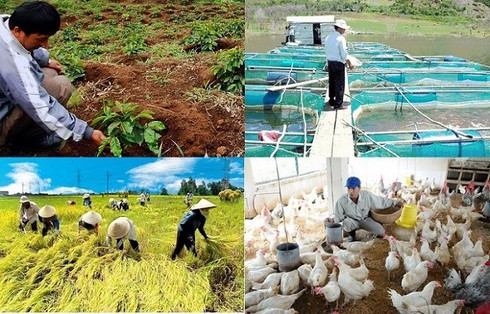
Despite difficulties and challenges, Vietnam earned 41 billion USD from agricultural exports in 2019.
Vietnam’s farm produce market in 2019, especially for some key export earners, was unstable due to the impacts of trade wars between major countries. African swine fever broke out quickly throughout provinces and cities, seriously affecting the hog herd with nearly 6 million pigs culled and dropping nearly 9% of the pork production.
Despite these difficulties, Vietnam earned more than 41 billion USD from exporting agro-forestry-fishery products last year, 3.5% more than 2018. The achievements are due to the sector’s prompt control of diseases in cattle and poultry production.
The restructuring of agricultural production boosted the growth of fruit trees, processing, and aquaculture, especially brackish water shrimp and tra fish.
To improve the efficiency and value of agricultural products, chains in processing and consumption has been established.
Nguyen Quoc Toan, Director of the Agricultural Products Processing and Market Development Department of the Ministry of Agriculture and Rural Development, said “The establishment of post-harvest processing plants in the Central Highlands plays an extremely important role in organizing production links, especially in material zones of passion fruit, avocado, and durian. This will also help the domestic processing industry further develop.”
Last year, Vietnam's rice industry continued to maintain its growth in productivity, production, and value while the brand of Vietnamese rice asserted its prestige in the international arena.
Tran Xuan Dinh, former Deputy Director of the Cultivation Department of the Ministry of Agriculture and Rural Development, said “The ST25 rice research team won First Prize in the World’s Best Rice Contest 2019. This is a great honor for Vietnamese rice in the international market.”
The forestry sector earned a record of more than 11 billion USD from exports this year.
Moreover, the EU-Vietnam Voluntary Partnership Agreement on Forest Law Enforcement, Governance and Trade offered a major opportunity for Vietnam’s timber products to enter the EU market.
Deputy Minister of Agriculture and Rural Development Ha Cong Tuan said “The agreement is of great importance showing Vietnam has harmoniously upheld international forest law enforcement in trading timber products and in origin tracing to develop the forestry sector sustainably. This will create a good foundation for a more transparent business environment to trade timber products.”
In 2020, the agriculture sector aims to maintain the current growth rate, continue to restructure toward sustainable development, and increase the value of exports.
Addressing a recent online conference of the agriculture sector, Prime Minister Nguyen Xuan Phuc asked the sector to become a key export earner and increase export to 43 billion USD next year and 50 billion USD by 2025, topping ASEAN and reaching the world’s top 10.
Prime Minister Phuc said "In 2020 and the years to come, the agricultural sector should focus on continuing its restructuring, developing commodity agriculture, applying the latest technology, enhancing the processing and preservation of farm produce to meet the market needs and requirements, and further expanding the market, especially the markets of the 28 EU countries. The sector should pay more attention to the quality and prestige of its agricultural products.”
Prime Minister Phuc also called on the sector to step up the restructuring of crops and livestock to meet market demands and adapt to climate change. He urged for more joint efforts to drastically and urgently remove the EC’s “yellow card” warning on Vietnamese seafood. VOV
 The agricultural sector has widely implemented value chains in production, consumption, market development, and established major production zones.
The agricultural sector has widely implemented value chains in production, consumption, market development, and established major production zones.